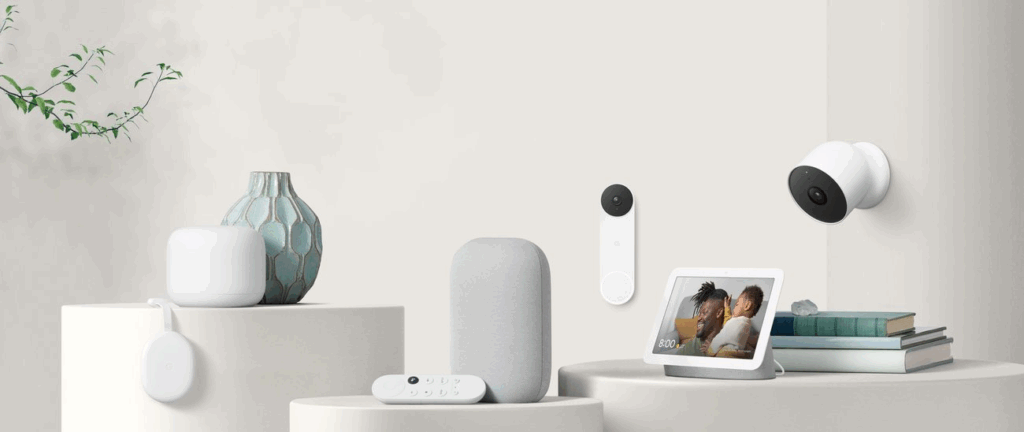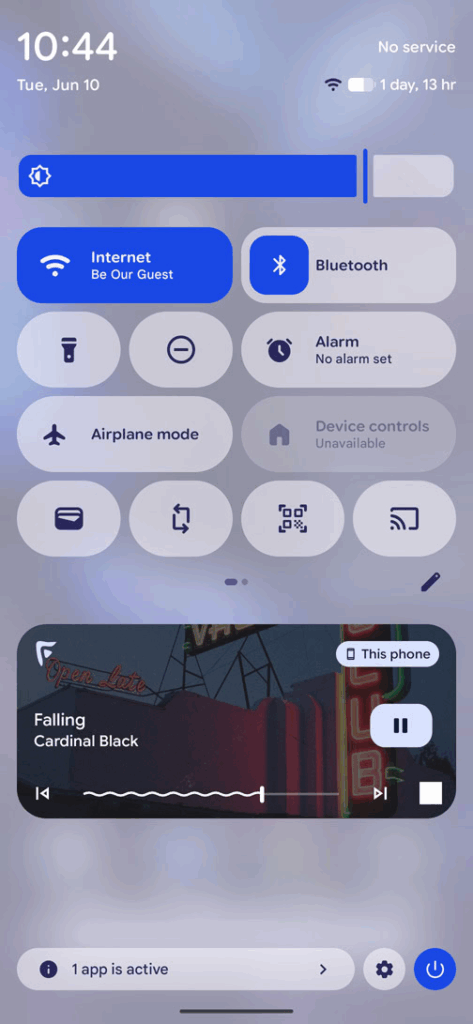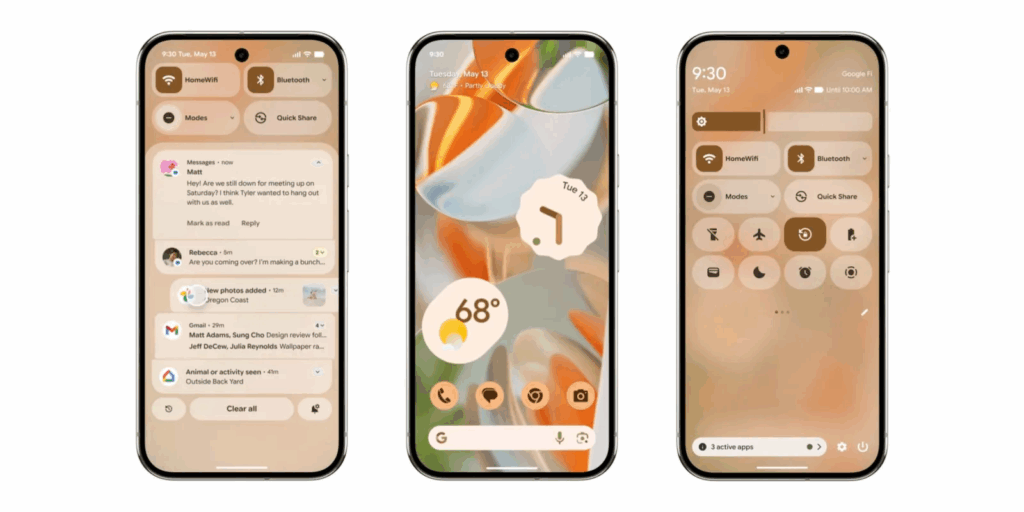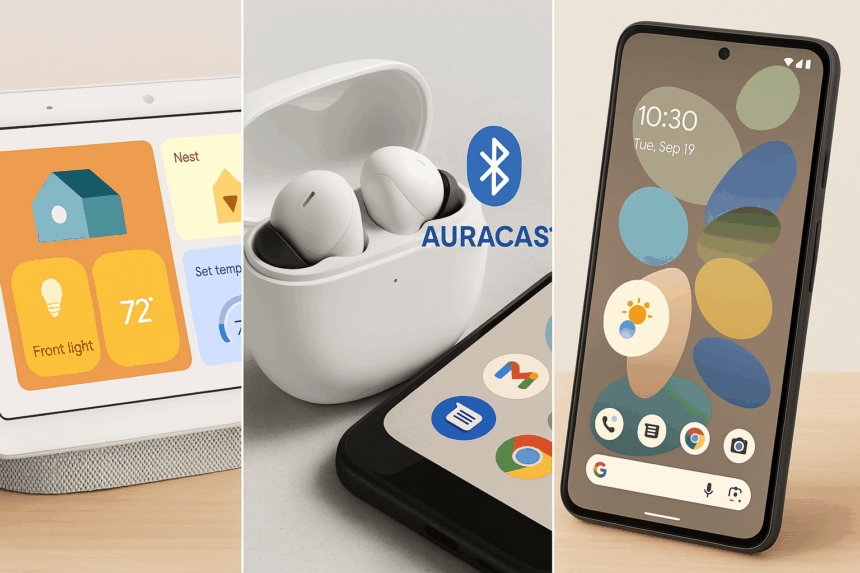Google is rolling out a fresh wave of updates for its smart devices and mobile ecosystem. The updates bring improvements to Nest smart home products, Auracast audio streaming, and the visually dynamic Material 3 Expressive interface for Pixel phones. The upgrades make the Google ecosystem more connected and engaging for users. New features focus on convenience and personalisation.
What’s Happening & Why This Matters
Smarter Nest Devices with Google Gemini
Google confirmed that its Gemini-powered AI will play a bigger role in Nest devices starting this October. This is one of the key highlights in Google products’ updates. The update will bring natural language understanding to Nest Hubs and other smart home products, allowing for voice commands that feel more intuitive. For example, users can now issue complex multi-step commands. They can say, “Dim the living room lights, lock the front door, and play my relaxation playlist,” and the system will execute seamlessly.

This enhancement builds on Google’s strategy to compete directly with Amazon Alexa and Apple HomeKit. Google aims to offer a more robust AI-driven smart home experience. By integrating Gemini AI into the Nest ecosystem, Google moves beyond simple automation and into predictive assistance. Here, devices can learn user habits and adapt over time. The innovations are part of Google products’ updates that promote AI advancements.
Pixel Phones Gain Auracast Audio Streaming
Auracast support is now available for Pixel 8 series devices and newer. This support expands how users share audio. Auracast utilises LE Audio technology to enable simultaneous streaming to multiple devices, much like a Wi-Fi hotspot connects multiple phones.
Imagine sharing a playlist with a friend on a train ride, or watching a movie together on two pairs of headphones — no adapters needed. Android devices from Xiaomi, POCO, and Samsung already support this technology. Google’s rollout to Pixel phones reinforces its commitment to multi-device audio streaming. The Auracast enhancements continue the momentum of the products’ updates.

Users can start private broadcasts with a larger group by sharing a QR code or using Fast Pair. This makes Auracast ideal for group settings like guided tours or public events. Google has even extended Auracast support to hearing aids. This opens up accessibility at Auracast-enabled public venues such as theatres or airports.
“Auracast turns your phone into a hub for shared audio experiences,” a Google spokesperson said, emphasizing its potential for social and accessibility applications.
Supported headphones now include select models from Sony, like the WH-1000XM6 and LinkBuds series. This gives users a wide range of compatible hardware.
Material 3 Expressive Interface Rolls Out

Pixel users with devices ranging from the Pixel 6 to the latest Pixel 10 series will receive the Material 3 Expressive UI in the latest quarterly Pixel Drop update. Initially showcased at Google I/O, this visual overhaul delivers dynamic theming by pulling colours directly from wallpapers and adding playful animations for a more polished look as part of Google’s product updates.
Beyond aesthetics, the update brings functional enhancements:
- Resizable quick settings for better customisation.
- Custom call screens for personalisation and accessibility.
- Desktop mode support, a feature that turns your Pixel into a portable workstation.
Later this month, Adaptive Audio also debuts on Pixel Buds Pro 2. The audio feature automatically adjusts volume levels based on ambient noise, similar to Apple’s Adaptive Transparency feature.

These updates are not just about looks. They reinforce Google’s push to deliver a seamless experience across its hardware ecosystem. The functionality connects phones, earbuds, and smart devices in a unified interface.
TF Summary: What’s Next
Google’s latest updates bridge gaps between its smart home, audio, and mobile platforms. The integration of Gemini AI with Nest devices introduces a future where predictive automation becomes standard. Meanwhile, Auracast audio streaming transforms how people share and experience sound, positioning Google as a leader in wireless audio innovation. For Pixel users, the Material 3 Expressive UI deployment represents Google’s commitment to delivering meaningful functionalities beyond just new phone launches.
PREDICTION: As each feature is adopted globally, expect tighter connections between Google hardware and services. Users can anticipate even smarter, more integrated homes and devices as Google regularly updates its product families.
— Text-to-Speech (TTS) provided by gspeech


